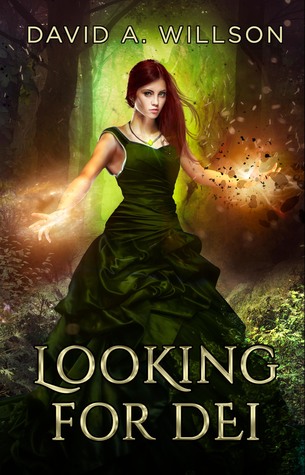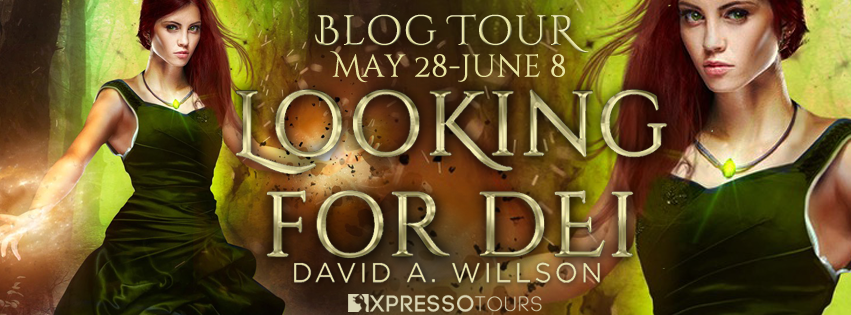 Looking for Dei
Looking for Dei by David A. Willson
Publication date: March 23rd 2018
Genres: Fantasy, Young Adult
Fifteen-year-old Nara Dall has never liked secrets. Yet it seems that her life has been filled with them, from the ugly scar on her back to the strange powers she possesses. Her mysterious father refuses to say anything about her origins, and soon, she and her best friend must attend the announcement ceremony, in which youths are tested for a magical gift. A gifted youth has not been announced in the poor village of Dimmitt for decades. When Nara uncovers the reason, she uses her own powers to make things right. The decision sets her on a path of danger, discovery, and a search for the divine. In the process, she learns the truth about herself and uncovers the biggest secret of all: the power of broken people.
~AUTHOR INTERVIEW with David A. Willson~
1) What gave you the inspiration for the storyline?
The inspiration for Looking for Dei was an interesting thing. Ever since I was a wee lad, I have wanted to
write a novel, and I tended to read lots of fantasy. Loved fantasy! My full-time job has been as a major crimes
investigations Sergeant, however, so my qualifications better fit the crime or
thriller genres, but my passion just hasn’t been with those genres, and they
didn’t fit my goals. Goals to inspire.
In my career, I’ve seen some of the most horrible things that people
do to each other. I’ve dealt with
heinous crimes, thousands of them, and learned a lot about human
suffering. Through all that, I’ve seen
how pain changes people, how it makes them fearful, and how it shuts them
down. It’s sad to see how we restrict
ourselves from doing great things because of fear of pain, and I wanted to
address that aspect of human experience.
I also wanted to address the importance of human life. Much of my worldview involves the inherent
value each human being has, a concept which is the core of the magic system in
Looking for Dei.
Through all these experiences, I’ve learned that we are all, to a
certain extent, broken. Pain changes us,
irrevocably affecting our experiences, and changing the lens through which we
view the world. Yet somehow, when broken
people triumph over the obstacles set before them (or those they create for
themselves), there is a sweet victory to be had. I wanted to tell that story, too. Victory is important stuff.
Pain, fear, inherent value, brokenness and victory. I wanted to show it all, and fantasy is a
very flexible genre for such ambitions.
Besides, I love fantasy novels.
Did I say that already?
Love! But I also wanted to
inspire, and I am convinced that there is no more fertile ground to plant these
seeds of hope than in the minds of our youth, so I chose Young Adult
Fantasy.
So there it is.
2) Are there any hidden themes in the book that you hope readers will
discover?
I don’t know if the pain and fear themes are well hidden, but the
spiritual aspect is muted a bit. While
the title of the book definitely points to a spiritual theme, I have
deliberately avoided being preachy. I
don’t think I have the right to preach - everyone gets to make their own
choices about such matters.
With that said, the vast majority of human beings on this planet
believe in some sort of deity, even if they aren’t actively practicing a
certain faith. I hoped that this story
would encourage them to explore their faith, which has seemed to fall out of
vogue in today’s society. I wanted to
say that prayer is ok. Wondering about
God is ok. Struggling with Him is
fine. That’s normal. I think we have all struggled with faith and
wondered why bad things happen to good people, among other things. Wondered why He lets us suffer. We’ve bargained with Him, pleaded with Him,
and been angry with Him. Even the most faithful folks on the planet struggle
with faith, how could they not struggle with so much suffering in the world.
And it’s all ok. In the end, life is a
magical journey, with many highs and lows, and if every day were perfect, our
lives would be boring, we wouldn’t have learned very much, and it wouldn’t have
made a very good story.
3) Are any of the characters based on real people you know?
Yup, yup, great question. I
poured a bit of myself into Bylo. My
sister Laura has made her presence known in the characters of both Nara and
Anne. One of my sons was a template I
used for building Mykel’s character, although Mykel is an amalgam of several
people I know, including one of my best friends. I’m not smart enough to make a person
completely from scratch - that’s the realm of the divine. I have to take shortcuts, so there are echoes
of many people I know and love throughout the pages of the book.
4) Who has influenced you most as a writer?
I think Hollywood has. I’ve
read a fair number of books, but since I can consume a movie in ninety minutes,
sitting next to my darling wife and holding her hand, I’ve seen more
movies. Of course, many of those stories
were found in books long before they made it to the big screen so in the end,
it’s all about the books. Still, movie watching has allowed me to explore many
more stories, with the rising action, character development, conflict creation,
etc. It’s allowed me to experience many,
many stories.
When you see the patterns of how screenwriters and directors have
crafted the story experience, it becomes much easier to develop plots of your
own, and that’s what has happened with me.
So I suppose that I have been most influenced by movie-makers: Aaron
Sorkin, William Goldman, Stanley Kubrick, and Steven Spielberg.
Of course, great novels have also influenced me, and I have to tip my
hat to Brandon Sanderson, CS Lewis, Tolkien, Orson Scott Card, William Goldman
(again) and other brilliant folks of this sort.
5) If you could have any three literary characters over to your place
for game night, who would you invite, what would you play, what would you serve,
and why?
Who would I invite? I’d invite
Inigo Montoya from The Princess Bride, first of all. He’s a riot. Love him. He would probably
bring Fezzik, which might be bad for my furniture due to his size, but I’d just
put a book of rhymes on the coffee table, order extra food and that would
probably keep him happy and harmless. I’d definitely invite Rodion Raskolnikov
from Crime and Punishment. Such a
brooding, introspective self-manipulator couldn’t help but be a fascinating
visitor, especially if he had a conversation with Fezzik. Lastly, I’d invite
Kvothe from The Name of the Wind. Maybe
he could tell us when Patrick Rothfuss is going to finish the series. I’d sure like to know.
What would we play? Video games,
of course. League of Legends, Player
Unknown’s Battleground, and maybe a little Call of Duty just for kicks. Return of the King would be playing on the
big screen TV during snack breaks and food would have to include pizza. All game nights require pizza. And pop tarts. Lots of pop tarts. Brown sugar/cinnamon are the best.
6) Do you feel that you can ever have too many books?
Only if you don’t have enough bookshelves. Books belong on shelves. Always.
Stacks of books on the floor or sitting in boxes is just a shame. Given
unlimited bookshelves, there is no limit to the books once could own. I wonder who has the high score…
 Author Bio:
Author Bio:David A. Willson has worked as a restauranteur, peace officer, and now, author. Taught by his mother to read at a young age, he spent his childhood exploring magic, spaceships, and other dimensions. In his writing, he strives to bring those worlds to his readers.
Much of his material is inspired by the “Great Land” of Alaska, which he has called home for over 30 years. He lives there with his wife, five children, and 2 dogs. He is passionate about technology, faith, and fiction — not necessarily in that order.
Looking for Dei is Willson’s debut novel, set in a land where many more adventures will take place. Stay up to date with his ongoing efforts through the Looking for Dei Facebook page or visiting the website at davidawillson.com.


Thanks for hosting today, Jen!
ReplyDelete